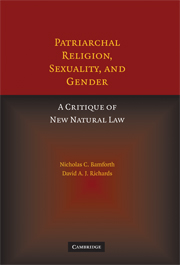Book contents
- Frontmatter
- Contents
- Acknowledgments
- 1 New Natural Law in Context
- 2 Criteria for Evaluating New Natural Law
- 3 The Architecture and Reach of New Natural Law
- 4 Internal Consistency (1): Is New Natural Law Secular?
- 5 Internal Consistency (2): New Natural Law and Thomas Aquinas
- 6 Substantive Appeal (1): What's Wrong with Homophobia and Sexism?
- 7 Substantive Appeal (2): New Natural Law, Sexism, and Homophobia
- 8 Moral Absolutes and the Possible Fundamentalism of New Natural Law
- 9 New Natural Law and Patriarchal Religion
- 10 Concluding Observasions, and Christian Alternatives to New Natural Law
- Bibliography
- Index
5 - Internal Consistency (2): New Natural Law and Thomas Aquinas
Published online by Cambridge University Press: 14 August 2009
- Frontmatter
- Contents
- Acknowledgments
- 1 New Natural Law in Context
- 2 Criteria for Evaluating New Natural Law
- 3 The Architecture and Reach of New Natural Law
- 4 Internal Consistency (1): Is New Natural Law Secular?
- 5 Internal Consistency (2): New Natural Law and Thomas Aquinas
- 6 Substantive Appeal (1): What's Wrong with Homophobia and Sexism?
- 7 Substantive Appeal (2): New Natural Law, Sexism, and Homophobia
- 8 Moral Absolutes and the Possible Fundamentalism of New Natural Law
- 9 New Natural Law and Patriarchal Religion
- 10 Concluding Observasions, and Christian Alternatives to New Natural Law
- Bibliography
- Index
Summary
We saw in Chapter 3 that the new natural lawyers generally seek to locate their arguments within the framework of the philosophy of Thomas Aquinas, but that they have also revised this framework and have sometimes departed from specific arguments advanced by Aquinas. In the course of that discussion, we encountered Ralph McInerny's comment that Grisez “often invokes Thomas in the course of developing his moral theology”, and that he does so for the pragmatic reason that “the Magisterium continue to recommend Thomas Aquinas as our mentor in philosophy and theology.” Implicit within this comment was a broader issue, which we consider in this chapter, namely, the extent to which the new natural lawyers are consistent in their approach to Thomas. To the extent that they are not, it is reasonable to ask – developing our analysis from Chapters 2 and 3 – whether their approach to Thomas in fact serves as a vehicle for their religiously grounded prescriptions, in particular those concerning sexuality. If it does so, then further weight is added to our argument, from Chapter 4, that the theory is to this extent internally inconsistent. We argue in this chapter that new natural law is not consistent in its approach to Thomas. For one thing, the new natural lawyers do not seem to have a clear basis for distinguishing between cases in which they move beyond or reinterpret Thomas and those in which they continue to defend the letter of his conclusions.
- Type
- Chapter
- Information
- Patriarchal Religion, Sexuality, and GenderA Critique of New Natural Law, pp. 151 - 189Publisher: Cambridge University PressPrint publication year: 2007



